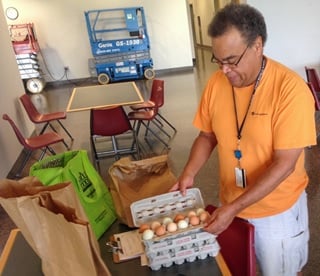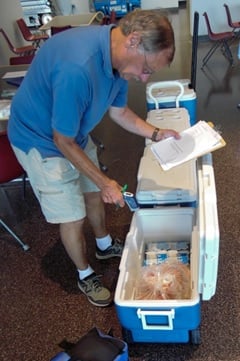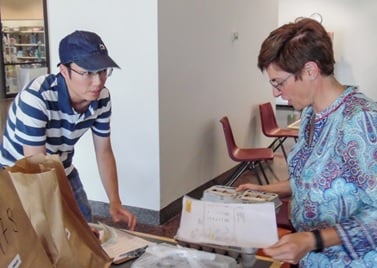Green Eggs and Ham, and Beef and More
 |
|
Robert Woodland, PhD, professor of microbiology & physiological systems, checks the eggs. |
The big sellers last month were the green eggs. And OK, they were brown and white, and only green in the spirit of the sustainable practices used by the farmers who sell through the Massachusetts Local Food Coop that distributes on campus. (Thank you Theodore Geisel.)
“My mother-in-law just loves the eggs!” said Robert Woodland, PhD, professor of microbiology & physiological systems, as he collected his family order. “I’ve been ordering through the coop for about five years, and it’s great. The food is wonderful and I want to support local farmers who are making great products.”
The membership-based nonprofit food coop is often described as an online farmers’ market. Established in 2009 to support the sustainability of local farmers and local foods, the coop now has more than 1,000 members.
“We don’t buy much food at the traditional grocery stores any more,” said Michael Volkert, PhD, professor of microbiology & physiological systems, and one of the campus volunteers who helps coordinate the food distribution. “We shop at the farmers’ markets, both on campus and elsewhere, and we like the food coop especially for their meats. The quality is great, the taste is really amazing, and we like the idea of supporting our local farmers.”
 |
|
Michael Volkert, PhD, professor of microbiology & physiological systems, logs the food temperature prior to distribution. |
It works like this: each month farmers and local vendors from across Massachusetts post their inventories of available products, such as grass-fed beef, pastured pork, free range poultry and eggs, made-from-scratch granola, pickles, soaps and candles and much more. There’s even a local shrimp farmer now selling through the coop, Volkert noted.
Coop members shop through the website, then on the second Thursday of every month, the farmers and vendors bring all their products to a refrigerated, USDA inspected warehouse in Gardner, Mass. Volunteers then separate the goods by member-order and deliver them to nine distribution sites across the state, including the Medical School Lobby.
Coop members from the UMass Chan community use a van provided by the school’s Auxiliary Services Department to drive to the warehouse and collect the orders for the campus.
“The whole coop is run by volunteers, and we could use a few more to help,” said Rachel Gerstein, PhD, associate professor of microbiology & physiological systems, who led the effort to get a distribution site on campus back in 2013.
“In addition to the quality of the food, a big part of what motivates me is the land conservation and sustainability impact on climate change,” Gerstein said. “Keeping farmers viable protects open space, and not having to ship food long distances cuts down on greenhouse gas emissions.”
To learn more, or to get involved, send an email to umms.ma.localfoods@gmail.com. Also, visit the Massachusetts Local Food Cooperative website to learn more about membership and to see the list of products available.
 |
|
Rachel Gerstein, PhD, associate professor of microbiology & physiological systems, verifies the order list for Morningside Graduate School of Biomedical Sciences student Tian Fang |
